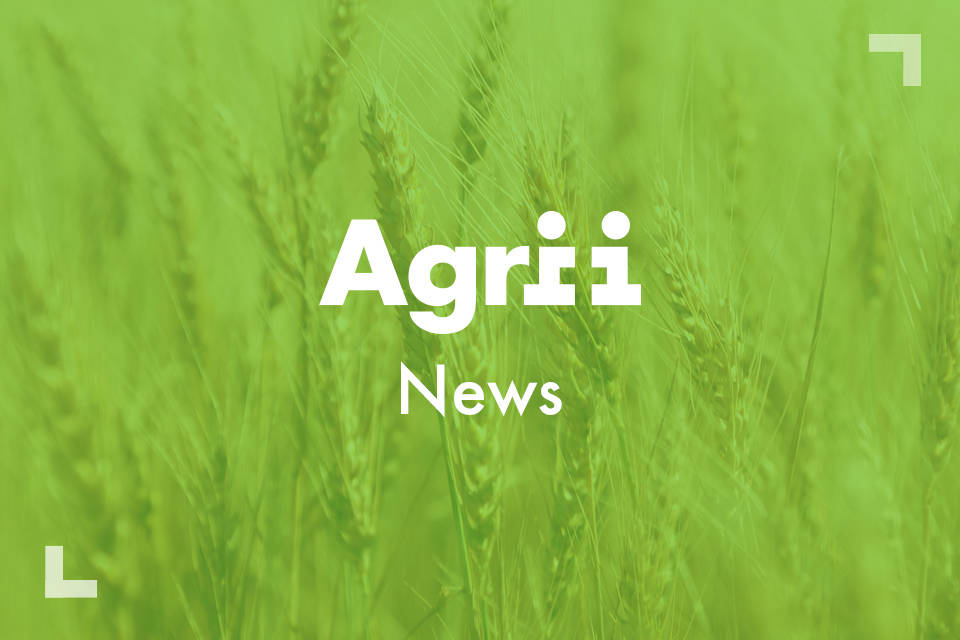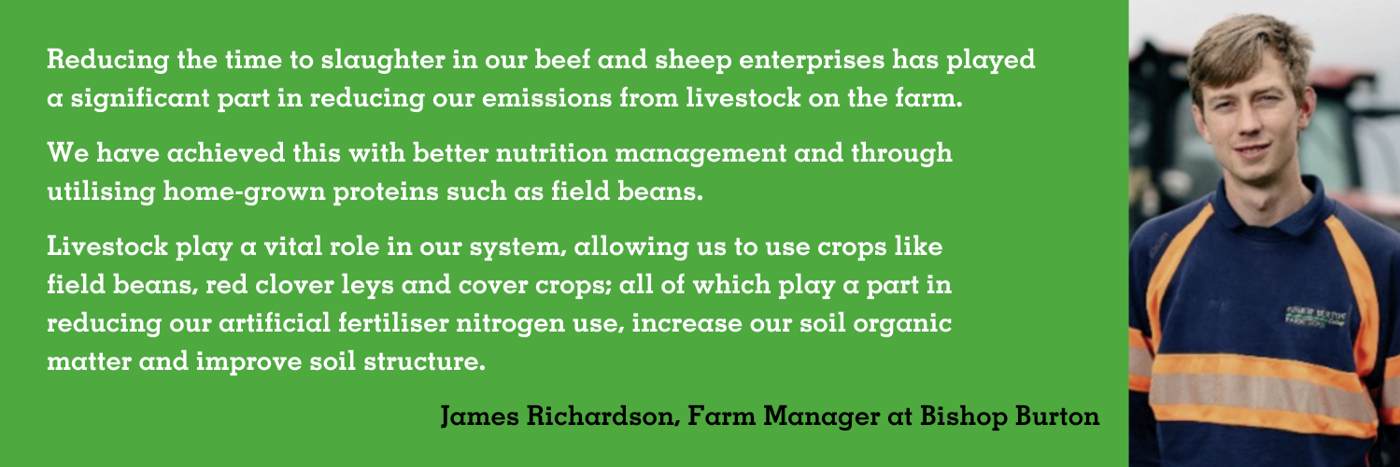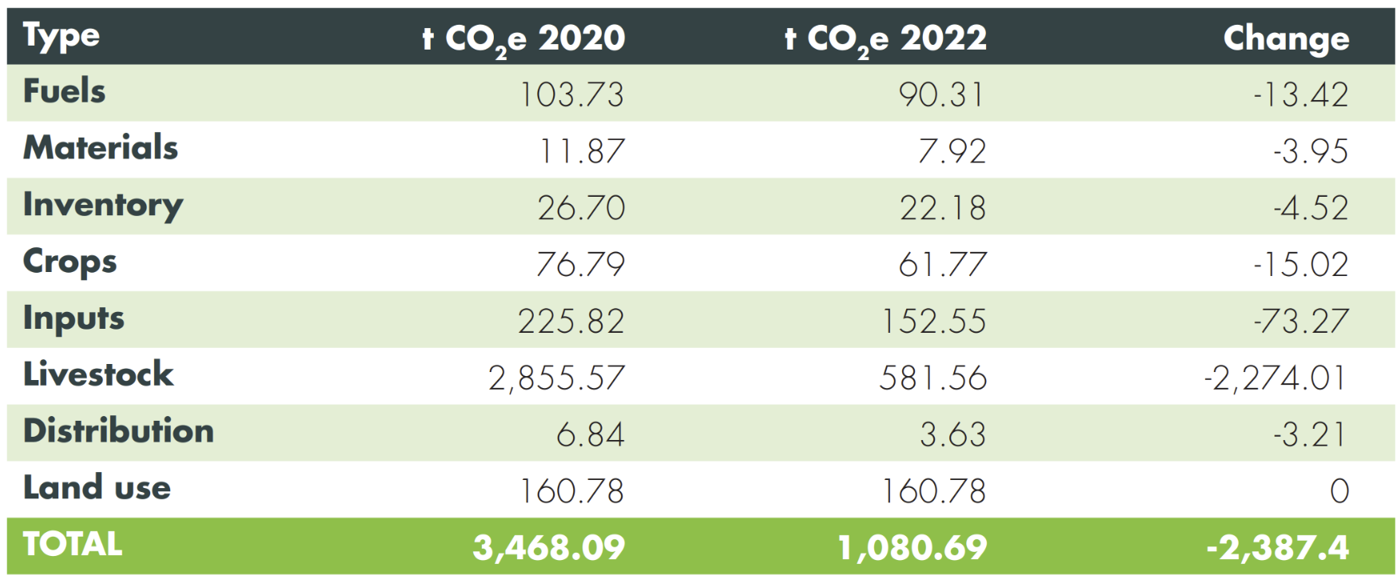
How can we become carbon neutral?
News - 06.07.23
Progress update from Bishop Burton Net Zero iFarm
A recent review of the carbon footprint at Bishop Burton, one of our Net Zero iFarms in East Riding, Yorkshire, has shown a carbon reduction of 2,441 tonnes of CO2 e between 2020 and 2022.
Despite the farm being a net ‘emitter’ of greenhouse gas (GHG) emissions, its footprint has significantly reduced across the site within the two-year period, putting the 355ha college farm in a stronger position towards meeting its goal of achieving net zero.
So how has this carbon reduction been achieved?
When breaking it down by category, it is noticeable that the majority of emissions reductions have been achieved from livestock (see table on page 2). In 2020, almost 80% of the livestock emissions were associated with animal protein sources, particularly soya.
Given the high carbon footprint of soya, James Richardson, the Farm Manager at Bishop Burton, has been investigating alternative feed sources. With previous experience of using herbal leys in the rotation, he is now beginning to introduce them to the college farm, with the aim of improving soil fertility, reducing fertiliser use and increasing resilience during periods of low or high rainfall. Combined with a general reduction in stock numbers this year, identifying alternative protein sources will significantly reduce the emissions from animal feed in future.

The choice to move fully to a strip till system in 2021 has also played a large part in reducing the diesel usage on farm, leading to a significant reduction of 13t CO2 e.
The new drill is also capable of variably applying seedbed fertiliser using maps created with the Contour system. The use of variable rate seed and nutrition ensures the farm is using inputs as efficiently as possible. Improving Nutrient Use Efficiency (NUE) has also been a focus for the farm, in investigating how they can reduce carbon emissions. James and his agronomist, Rob Daniel, have been using nitrogen inhibitors across the farm, not only to reduce carbon emissions, but also to slow the release of nitrogen to the crop, reducing the potential for environmental losses.
In 2022, replacing straight AN for Enhanced Urea, has reduced the carbon footprint of applied nitrogen by 1 kg CO2 e per kg ofnitrogen. This equates to a 23.75t CO2 e reduction across the farm without any yield penalty.
Using a more targeted approach has meant that, per tonne of wheat, their GHG emissions are significantly below the UK average of 340 kg CO2 e/tonne for feed wheat.
The important factor to note with figures like these is that they only account for the emissions from the manufacturing of fertiliser from raw material to farm gate. Although within some of our research we are quantifying the nitrous oxide emissions from the application of fertiliser, there are a number of variables which will affect these, so defining a final figure is very difficult.

A step closer to Net Zero
Achieving a significant reduction in emissions has been a huge success for the college farm, and with help from Rob, James will continue to develop new approaches which could help to further reduce the farm’s emissions. A key area that the team will be focusing on over the next year is how to account for the level of carbon sequestration on the farm. To date, a small proportion of the farm has historic soil organic matter figures, and these account for one year’s worth of data.
For 2023-24, James is keen to sample the whole farm for soil organic matter – not only to quantify carbon stocks, but also to help him to prepare for the new Soil Standard under the Sustainable Farming Incentive (SFI).
“We are already practicing many of the elements of the SFI schemes on farm, therefore I see the SFI more as a reward for good practice than as an incentive to change. For me, good soil management is a long-term project, and significant change requires more than a three-year commitment.
That said, a lot of the SFI standards sit well alongside our Countryside Stewardship agreement which commenced in January 2023. As we move into a new period of Environmental Land Management (ELM), I’m interested to see how these schemes develop,” James Richardson, Farm Manager at Bishop Burton says.
Summary table showing the reductions in emissions that have been achieved at Bishop Burton between 2020 and 2022

Key areas that have been central to carbon reduction at Bishop Burton:
✚ Developing alternative feed sources for livestock on the farm – reducing reliance on soya
✚ Reducing the time to slaughter through better nutrition management and a general reduction in stock numbers
✚ Reduced diesel usage as a result of a move to strip till
✚ Variable rate seed and nutrient application – improving efficiency
✚ Focus on improving Nutrient Use Efficiency
FIVE TOP TIPS FOR ACHIEVING NET ZERO
Assessing the outcomes from several Net Zero projects over recent years at Agrii, we have recognised trends in some of the initiatives that help growers on their journey.
So, what practices could you start implementing today?
1. Using inhibitors where possible
Nitrogen fertilisers are the largest emitter in arable systems. By using an inhibitor, you are able to slow the release of nitrogen, in the form of nitrous oxide, to the environment.
Other benefits of using an inhibitor include:
✚ Improving NUE – providing both economic and environmental benefits
✚ Reducing fuel usage – research has shown that inhibitors can enable you to cut out a pass of nitrogen later in the season.
2. Do the maths: try and calculate your farm’s figures to account for sequestration
This includes soil organic matter testing and knowing the length and width of the hedgerows on your farm (if you don’t know the length and width then the number of hectares they cover is fine).
3. Add organic inputs into the system
While cover cropping, addition of organic manures, or incorporating crop residues can sometimes increase your emissions in the short term, improving soil organic carbon levels and general soil health will help improve your carbon balance further down the line.
4. Reduce soil disturbance
This may not be possible in every system, but there is no getting away from the fact that cultivating soils oxidises carbon. Simply reducing the frequency of deep cultivations or ploughing over a rotation can reduce the loss of carbon and the diesel usage associated with crop production.
5. Electricity usage
Where possible, choose a renewable energy tariff, or better still, use on-site renewable sources such as solar panels and biomass boilers for practices such as grain drying.
FOCUS ON: Alternative Protein Sources
Investigating domestically produced sources of protein with a low carbon footprint, has been a key area of research for Agrii over the last five years.
Home-grown protein provides the benefits of a fully traceable animal feed ration and reduced reliance on imported protein sources such as soya. Crops such as peas and beans fix nitrogen, providing nutritional benefits for the following crop and improve soil health.
Agrii has also been working on trials with lupins over recent years, and with developments in maturity identified in our screening trials, typical protein contents of 28-32% have been achieved from commercial crops with UK growers.
We’re continuing to trial varieties to find those best suited to the UK and also work with end users to broaden their market appeal.
Join Our Community

Agrii X
We love engaging with clients and partners. Give us a follow and let's share stories for the community.

Agrii Instagram
A picture paints a thousand words. Follow us on Instagram to see what we are up to.

Agrii Facebook
Follow us on the worlds biggest social media site for the latest news and events straight to your feed.

Agrii LinkedIn
If you are all about the business, connect with us on LinkedIn to build your network
Stay In Touch

Newsletter Sign-Up
Receive email updates on topical news and information from around Agrii and UK Farming.

Listen To Our Podcasts
Listen to the Tramlines Podcast. Fortnightly chat about agriculture and trials with your host Tony Smith.

Agrii Insights
Read essential agri intelligence for profitable farming.

Find an Event
Join us for our upcoming events and tours.



